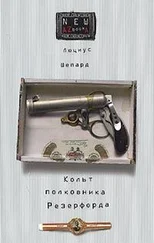“I can’t do a thing,” I told him.
“You’re his friend!” he said. “If you tell ’em I didn’t have nothin’ to do with it, they’ll believe you.”
“The hell they will! They’ll think I helped you.” I studied him a second, enjoying his anxiety. “Who did help you?”
“I didn’t do it, goddammit!” His voice had risen to a shout, and he had to struggle to keep calm. “I swear! It wasn’t me!”
It was strange, my mental set at that moment. I found I believed him—I didn’t think him capable of manufacturing sincerity—and yet I suddenly believed everything: that Randall was somehow both dead and alive, that Delta Sly Honey both did and did not exist, that whatever was happening was an event in which all possibility was manifest, in which truth and falsity had the same valence, in which the real and the illusory were undifferentiated. And at the center of this complex circumstance—a bulky, sweating monster—stood Moon. Innocent, perhaps. But guilty of a seminal crime.
“I can make it good for you,” he said. “Hawaii… you want duty in Hawaii, I can arrange it. Hell, I can get you shipped Stateside.”
He struck me then as a hideous genie offering three wishes, and the fact that he had the power to make his offer infuriated me. “If you can do all that,” I said, “you ain’t got a worry in the world.” And I strode off, feeling righteous in my judgment.
Two nights later while returning to my hooch, I spotted a couple of men wearing tiger shorts dragging a large and apparently unconscious someone toward the barrier of concertina wire beside the PX—I knew it had to be Moon. I drew my pistol, sneaked along the back wall of the PX, and when they came abreast I stepped out and told them to put their burden down. They stopped but didn’t turn loose of Moon. Both had blackened their faces with greasepaint, and to this had added fanciful designs in crimson, blue, and yellow that gave them the look of savages. They carried combat knives, and their eyes were pointed with the reflected brilliance of the perimeter lights. It was a hot night, but it seemed hotter there beside them, as if their craziness had a radiant value. “This ain’t none of your affair, Curt,” said the tallest of the two; despite his bad grammar, he had a soft, well-modulated voice, and I thought I heard a trace of amusement in it.
I peered at him, but was unable to recognize him beneath the paint. Again I told them to put Moon down.
“Sorry,” said the tall guy. “Man’s gotta pay for his crimes.”
“He didn’t do anything,” I said. “You know damn well Randall’s just AWOL.”
The tall guy chuckled, and the other guy said, “Naw, we don’t know that a-tall.”
Moon groaned, tried to lift his head, then slumped back.
“No matter what he did or didn’t do,” said the tall guy, “the man deserves what’s comin’.”
“Yeah,” said his pal. “And if it ain’t us what does it, it’ll be somebody else.”
I knew he was right, and the idea of killing two men to save a third who was doomed in any event just didn’t stack up. But though my sense of duty was weak where Moon was concerned, it hadn’t entirely dissipated. “Let him go,” I said.
The tall guy grinned, and the other one shook his head as if dismayed by my stubbornness. They appeared wholly untroubled by the pistol, possessed of an irrational confidence. “Be reasonable, Curt,” said the tall guy. “This ain’t gettin’ you nowhere.”
I couldn’t believe his foolhardiness. “You see this?” I said, flourishing the pistol. “Gun, y’know? I’m gonna fuckin’ shoot you with it, you don’t let him go.”
Moon let out another groan, and the tall guy rapped him hard on the back of the head with the hilt of his knife.
“Hey!” I said, training the pistol on his chest.
“Look here, Curt…” he began.
“Who the hell are you?” I stepped closer, but was still unable to identify him. “I don’t know you.”
“Randall told us ’bout you, Curt. He’s a buddy of ours, ol’ Randall is. We’re with Delta Sly Honey.”
I believed him for that first split second. My mouth grew cottony, and my hand trembled. But then I essayed a laugh. “Sure you are! Now put his ass down!”
“That’s what you really want, huh?”
“Damn right!” I said. “Now!”
“Okay,” he said. “You got it.” And with a fluid stroke, he cut Moon’s throat.
Moon’s eyes popped open as the knife sliced through his tissues, and that—not the blood spilling onto the dust—was the thing that froze me: those bugged eyes in which an awful realization dawned and faded.
They let him fall face downward. His legs spasmed, his right hand jittered. Far a long moment, stunned, I stared at him, at the blood puddling beneath his head, and when I looked up I found that the two men were sprinting away, about to round the curve of the hill. I couldn’t bring myself to fire. Mixed in my thoughts were the knowledge that killing them served no purpose and the fear that my bullets would have no effect. I glanced left and right, behind me, making sure that no one was watching, and then ran up the slope to my hooch.
Under my cot was a bottle of sour mash. I pulled it out and had a couple drinks to steady myself; but steadiness was beyond me. I switched on my lamp and sat crosslegged, listening to the snores of my bunkmate. Lying on my duffel bag was an unfinished letter home, one I had begun nearly two weeks before; I doubted now I’d ever finish it. What would I tell my folks? That I had more or less sanctioned an execution? That I was losing my fucking mind? Usually I told them everything was fine, but after the scene I had just witnessed, I felt I was forever past that sort of blithe invention. I switched off the lamp and lay in the dark, the bottle resting on my chest. I had a third drink, a fourth, and gradually lost both count an dconsciousness.
I had a week’s R & R coming and I took it, hoping debauch would shore me up. But I spent much of that week attempting to justify my inaction in terms of the inevitable and the supernatural, and failing in that attempt.
See, now as then, if pressed for an opinion, I would tell you that what happened at Noc Linh was the sad consequence of a joke gone sour, of a war twisted into a demonic exercise. Everything was explicable in that wise. And yet it’s conceivable that the supernatural was involved, that—as Randall suggested—a little magic had seeped into the world. In Vietnam, with its horror and strangeness, it was difficult to distinguish between the magical and the mundane, and it’s possible that thousands of supernatural events went unnoticed as such, obscured by the poignancies of death and fear, becoming quirky memories that years later might pass through your mind while you were washing the dishes or walking the dog, and give you a moment’s pause, an eerie feeling that would almost instantly be ground away by the mills of the ordinary. But I’m certain that my qualification is due to the fact that I want there to have been some magic involved, anything to lessen my culpability, to shed a less damning light on the perversity and viciousness of my brothers-in-arms.
On returning to Noc Linh, I found that Randall had also returned. He claimed to be suffering from amnesia and would not admit to having made the broadcast that had triggered Moon’s murder. The shrinks had decided that he was bucking for a Section Eight, had ordered him put back on the corpse detail, and as before, Randall could be seen laboring beneath the tin-roofed shed, transferring the contents of body bags into aluminum coffins. On the surface, little appeared to have changed. But Randall had become a pariah. He was insulted and whispered about and shunned. Whenever he came near, necks would stiffen and conversations die. If he had offed Moon himself, he would have been cheered; but the notion that he had used his influence to have his dirty work jobbed out didn’t accord with the prevailing concept of honorable vengeance. Though I tried not to, I couldn’t help feeling badly toward him myself. It was weird. I would approach with e best of intentions, but by the time I reached him, my hackles would
Читать дальше






